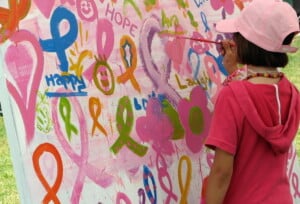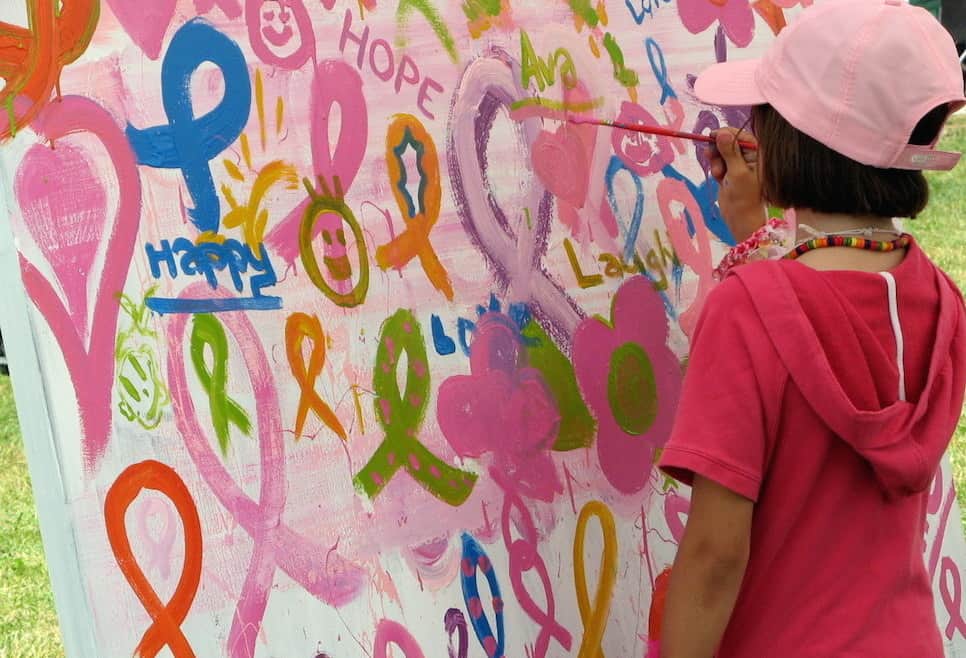When a parent has cancer, the impact on the children can be profound. Effects can be seen in the children’s mental health, social relationships, and overall growth and development. To date, however, there are no evidence-based interventions designed specifically for children dealing with parental cancer.
Farya Phillips, the dean’s postdoctoral research fellow in psychosocial oncology and a member of the Institute for Collaborative Health Research and Practice, is working to change that.

Tell us about your project.
I’m collaborating with Wonders & Worries, a local nonprofit in Austin that helps kids whose parents have any kind of life-threatening illness. They offer a free, six-week comprehensive, individualized counseling program for children ages two to 18, and I’m conducting an evaluation of this program.
One of the goals of our Institute for Collaborative Health Research and Practice is to engage the community. We knew that there was research done on the impact of parental cancer on children, but not many intervention studies. And we have Wonders & Worries at our doorstep, doing this great work that could benefit from a rigorous evaluation. We thought it was a perfect combination. We have the goal of moving the field of psychosocial oncology forward by creating and finding interventions that can help, and we can help Wonders & Worries understand why their program is effective.
Why would an evaluation be beneficial?
Their program is based on sound theories and professional experience, and they have been conducting surveys with the parents. So they have some useful data that I’m helping to analyze. But these data do not tell us what piece of their intervention is working, or what the intervention is specifically affecting. Is it affecting parenting behaviors, children’s anxiety levels, communication about the illness in the family? Even though they anecdotally and qualitatively see that children and parents are coping better, they don’t actually know what active ingredient, so to speak, is making the difference for these families. With our evaluation, which is a randomized controlled trial using standardized measures, we’ll be able to figure out the specifics mechanisms of change within the intervention.
Why is this knowledge important? Their program has worked so well that they want to expand beyond the Austin area, and they are trying to figure out the best way to do that. I explained we must determine whether the six-week curriculum is making the difference or the million other things they do outside of it –the family parties they throw, the relationships they build, and so on. If this evaluation proves that the curriculum makes the difference, then that is something that they could easily disseminate by training, say, a social worker in an oncology center, for her to work with cancer patients’ children. That’s an easier way of disseminating their work than creating stand alone Wonders & Worries all over the country, which would be more difficult to do.
How has it been working with Wonders & Worries as a community partner?
It has been great. We have monthly team meetings with all child life specialists, the program director, and the executive director, because I want to make sure that the staff feels comfortable with the study, and that we deal with issues as they arise. We also had the advantage of their trust from day one, because I used to work there as a program coordinator. I actually trained many of the child life specialists who deliver the intervention today. They know that I care about these children and families just as much as they do, so they are more willing to go beyond their comfort level. For example, when we were creating the research protocol we realized that each child life specialist had their own style of presenting the curriculum to the kids. So we had to make sure to standardize everything. I told them, “It’s like giving them a dose of medicine: we have to make sure that each child receives exactly the same dose.” I’m pushing them to do things that make them a bit uncomfortable but I’m also trying to help them see the bigger picture, and the benefits that will come from a rigorous evaluation.
These are the kinds of things that are really interesting about working in a community setting and evaluating something that already exists. I also belive this is a great use of resources for researchers. Instead of creating something from scratch, let’s look at something that is already working, that we know is feasible—it has been in the community for years, and people who have been through the program say it has been beneficial to their families. I’m very glad that I stayed in Austin and that I have this opportunity to go back and conduct this evaluation. Wonder & Worries is part of the reason why I became a researcher in this field, so it has come full circle for me!
Posted February 17, 2016. By Andrea Campetella.


